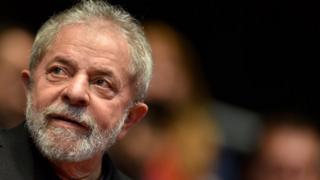Home » Latin America »
Lula: Only death will take me off streets
It took Luiz Inacio Lula da Silva four attempts before he was finally elected as Brazil’s president in 2002.
He came to office as the first leftist leader in Brazil in nearly half a century. And he left eight years later, after serving two terms as president, enjoying exceptionally high popularity ratings for a retiring Latin American leader.
His 2002 election victory marked the end of an unprecedented journey from abject poverty to the presidency of Brazil.
Lula came to power promising major reforms to the country’s political and economic system.
He vowed to eradicate hunger and create a self-confident, caring, outward-looking nation.
Analysts say it was because of some of his government’s social programmes, which benefited tens of millions of Brazilians, that Lula retained his popularity.
He raised Brazil’s profile on the international scene and presided over Brazil’s longest period of economic growth in three decades, they say.
After the presidency
Unable to stand for a third consecutive term, Lula was succeeded by close ally Dilma Rousseff, who was later impeached.
The economic boom also gave way to recession, and the country’s political scene was rocked by a huge investigation into alleged top-level corruption, known as Operation Car Wash.
Lula was among those to get caught up in the scandal. In July 2017, he was convicted of corruption and sentenced to more than nine years in prison.
He appealed against the conviction but in January, three judges at the appeals court in Porto Alegre upheld it and increased the sentence to 12 years and one month in prison. In April, he began serving his sentence.
He also faces other charges of money laundering, influence peddling and obstruction of justice. Lula has repeatedly denied the accusations, and his supporters say he has been unfairly targeted.
Road to pragmatism
Lula’s life began in humble circumstances.
The son of a poor, illiterate peasant family, Lula worked as a peanut seller and shoe-shine boy as a child, only learning to read when he was 10 years old.
He went on to train as a metal worker and found work in an industrial city near Sao Paulo, where he lost the little finger of his left hand in an accident in the 1960s.
Lula was not initially interested in politics but threw himself into trade union activism after his first wife died of hepatitis in 1969.
Elected leader of the 100,000-strong Metalworkers’ Union in 1975, he transformed trade union activism in Brazil by turning what had mostly been government-friendly organisations into a powerful independent movement.
In 1980, Lula brought together a combination of trade unionists, intellectuals, Trotskyites and church activists to found the Workers’ Party (PT), the first major socialist party in the country’s history.
The PT went on to gradually replace its revolutionary commitment to changing the power structure in Brazil with a more pragmatic, social democratic platform.
Before his 2002 election victory, Lula had previously lost three times and he began to believe his party would never win power nationally without forming alliances and keeping powerful economic players onside.
His coalition in that election included a small right-wing party and he carefully courted business leaders both in Brazil and abroad.
The Workers’ Party manifesto reflected these sometimes conflicting visions but overall remained committed to prioritising the poor, encouraging grassroots participation and defending ethical government.
Performance in power
In his time in office, Lula pumped billions of dollars into social programmes and can reasonably claim to have helped reverse Brazil’s historic inequalities.
By increasing the minimum wage well above the rate of inflation and broadening state help to the most impoverished with a family grant programme, the Bolsa Familia, he helped some 44 million people and cemented his support among the poor.
However, many commentators argue that the programme failed to address the structural problems that underpin poverty, such as education.
There was also some criticism of the country’s economic performance under Lula. Although Brazil saw steady annual growth, some business leaders argued it lost its competitive edge against international rivals.
Nonetheless, his government quelled fears in financial markets by keeping the economy stable and achieving a budget surplus.
Shortly after leaving office, Lula was diagnosed with throat cancer. He even shaved his trademark beard during treatment. Doctors declared him cured of the disease in 2012.
His wife, Marisa Leticia da Silva, died in February 2017, after suffering a brain haemorrhage.
Frontrunner
When he surrendered to police to begin his sentence on 7 April, Lula was the frontrunner in the presidential election scheduled for 7 October.
An opinion poll conducted by Datafolha in January suggested 36% of voters wanted to see him return to the top post, far ahead of the 18% of voters who said they would cast their ballot for the far-right politician Jair Bolsonaro.
The poll reflected the deep divisions in Brazilian society.
Lula himself has often said he is determined to continue in politics.
“Only one thing will take me off the streets of this country, and it will be the day of my death,” he said to his supporters ahead of his appeal in January.
But he is now behind bars, with the prospect of returning to power as remote as ever.
Source: Read Full Article



